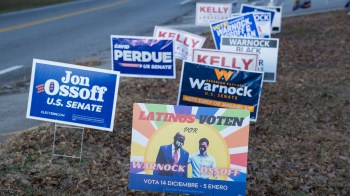Teaching the business of politics
TEXT OF STORY
KAI RYSSDAL: If you’re a lobbyist with ties to, say, foreign countries or commercial interests, John McCain’s presidential campaign is probably not the place for you. A strict new policy on those outside associations has led to a number of departures from the campaign over the past couple of days. But not all political candidates are so gun-shy about their corporate connections. In fact, some are specifically recruited by business lobbying groups. Judith Smelser reports from WMFE in Orlando, Florida.
JUDITH SMELSER: BusinessForce. It may sound like a super-hero movie for the CPA set but it’s actually a political action committee for Orlando’s Chamber of Commerce. Chamber consultant Mark Mills says lately the quality of candidates asking for its support has been, well, unimpressive.
MARK MILLS: Many of them either don’t have the leadership skills once they’re elected, don’t have a clue as to how to run a campaign, and don’t have an idea about the critical issues facing our region.
Business Force is trying to change that. Earlier this year it launched a training institute for potential candidates, but the selection committee wasn’t looking for just any political wannabes.
MILLS: Looking for people who have a background in business who would be able to take what they’ve learned in business — fiscal responsibility, what it takes to create jobs — take those skills with them to the public level.
The chosen participants were treated to a two-day free seminar on the basics of running a campaign. It was paid for by several corporations, including AT&T, Outback Steakhouse, and Orlando’s three major theme parks.
Aubrey Jewett is a political science professor at the University of Central Florida. He says it’s usually political parties that do candidate training.
AUBREY JEWETT: Interest groups, including business groups, traditionally are political organizations that band together just to try to influence public policy — not so much to actually train people to run and win elections. And so I think that’s what’s somewhat interesting about this particular situation.
Twenty-eight-year-old Christina Dixon is one of the participants in the BusinessForce institute. Today she’s meeting for coffee with her mentor in the program, Dori Madison.
Both women are Republicans. The institute is nonpartisan, though, and Dori says BusinessForce doesn’t try to set the agenda for their meetings.
DORI MADISON: I mean, nobody on the BusinessForce board said, OK, these are the issues you’re going to cover. It depends on the candidate.
As a civil engineer, one of Christina’s interests is land development, and she thinks businesses could teach the public sector a thing or two.
CHRISTINA DIXON: They move so much faster. And it’s not that the public can’t eventually get there. It’s just that they have so many different steps and processes that they have their hands tied with. The developers can help facilitate that and push it along and try and get things going a little bit faster.
Those views from a would-be political candidate may be music to the ears of the business community, but maybe not so much for, say, local environmentalists.
Again, political scientist Aubrey Jewett.
JEWETT: If this thing actually works and there are elected officials that emerge out of this that win elections and them presumably are a little even more favorable to business, I suspect other groups — consumer groups, environmental groups, etc. — would probably try the same sort of thing.
Still, Jewett says the BusinessForce graduates aren’t likely to change the face of Florida politics in a big way, since pro-business politicians already dominate much of the state’s political landscape.
In Orlando, I’m Judith Smelser for Marketplace.
There’s a lot happening in the world. Through it all, Marketplace is here for you.
You rely on Marketplace to break down the world’s events and tell you how it affects you in a fact-based, approachable way. We rely on your financial support to keep making that possible.
Your donation today powers the independent journalism that you rely on. For just $5/month, you can help sustain Marketplace so we can keep reporting on the things that matter to you.


















